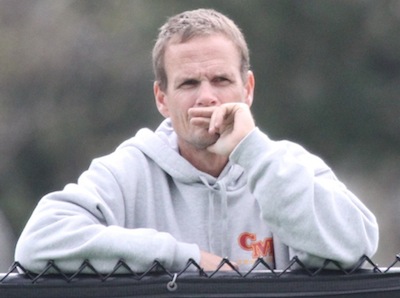
Settles Interview Featured in TennisRecruiting.net Article
Head Men's Tennis Coach Paul Settles was featured in a Questions and Answers interview for college tennis' premiere recruiting site tennisrecuiting.net
Click Here for Complete Interview
Ask The Experts
Talking with Paul Settles, Head Coach of Claremont-Mudd-Scripps
by Ross Greenstein, 10 February 2011
Special from Scholarship For Athletes Share:
Ross Greenstein and the SFA team chat with Paul Settles, Head Coach of Men's Tennis for Claremont-Mudd-Scripps Colleges. Settles reminds us that having good character, a passionate mentality, and a solid academic resume are overlooked, but highly crucial keys to successful recruiting.
Questions and Answers
Paul Settles, Head Coach at CMS Colleges
courtesy, CMS Athletics
Scholarship For Athletes (SFA): What advice do you have for the parents of high school student athletes about the recruiting process? Paul Settles (PS): The happiest student-athletes are the ones whose parents have let them take the lead in the recruiting process. I think the best model to follow is the parent as consultant - a good listener who can ask the right questions and get their son or daughter to articulate what's important to them in a school and tennis program.
SFA: What information should an athlete know prior to making their initial school list?
PS: They should evaluate where they would be happy if tennis weren't a factor. I think this is both the starting and ending point in creating a list of schools to consider.
SFA: Should the athletes let you know what tournaments, games, and events, they will be playing in and their results from these events?
PS: The astute coach is on top of this information, but still wants to know that the prospective student-athlete cares and desires communication. I find that the "upcoming events" or "latest results" communications are often an entree to more substantive exchanges between the recruit and coach. The academic equivalent of tournaments and events - grades and standardized test scores - are equally important to me, since the academics here are top notch. I want to know what's coming up and how it went.
SFA: What kind of questions should every high school student athlete ask their potential college coaches?
PS: It is very important to establish candid, transparent communication from the beginning. For me, the two most important questions are: "Do you think I have what it takes academically to be admitted to your school?", and "Where am I on your recruiting list?" Both parties also need to understand that the answers to these questions can change over time - a student's grades and test scores can improve or decline just as dramatically as his ranking.
SFA: What attributes do you look for in a recruit and why?
PS: Real simple - I want a nice kid who is passionate and a good sport. I want to be able to see that first-hand, and also hear about it from an objective source. I also want an athlete who really loves to play tennis, and isn't doing it because he feels like he has to or merely because he's been doing it his whole life.
SFA: What is your recruiting philosophy?
PS: Don't recruit anyone I wouldn't want dating my teenage daughter. That's how strongly I feel about recruiting kids with good character. I'm going to be spending almost every day of my life with them for their next four years, so I want kids who I can get along with and who I can build strong relationships with.
SFA: How important is an athletes ranking to you?
PS: A ranking is just a number, and a star is just a symbol. I start by looking at results and listening to objective sources who I trust. Often, the ranking and star rating validate that information, but neither should be used as the sole basis for assessment.
SFA: What are your coaching philosophies?
PS: I'm all about efficiency - getting more out of less. I apply the principle to training, practice, even tactical decisions in competition. I also believe that competing well - where preparation, poise, execution, and sportsmanship all intersect - provides a life lesson that can be applied to just about anything a student-athlete encounters after his college years.
SFA: What are the most common misconceptions among athletes and parents about college athletics?
PS: Parents worry that being on a team will put their son or daughter at an academic disadvantage relative to their non-athlete classmates. This is far from true, as we keep our athletes in check and make sure they are thriving in the classroom.
SFA: What would you like to see more of from high school athletes? PS: Commitment to their high school team regardless of the team's success. I'd also like to see more elite tennis players playing other team sports into their high school years.
SFA: Why do you think so many high school student athletes don't build strong relationships with the coaches and current players on the teams during their recruiting process?
PS: I think many are more comfortable at a safe distance, knowing that if things don't work out, they haven't invested too much emotionally in the process. However, as a coach, you have to wonder how much a prospective student-athlete will invest himself in his future team if he has been passive during the recruiting process.